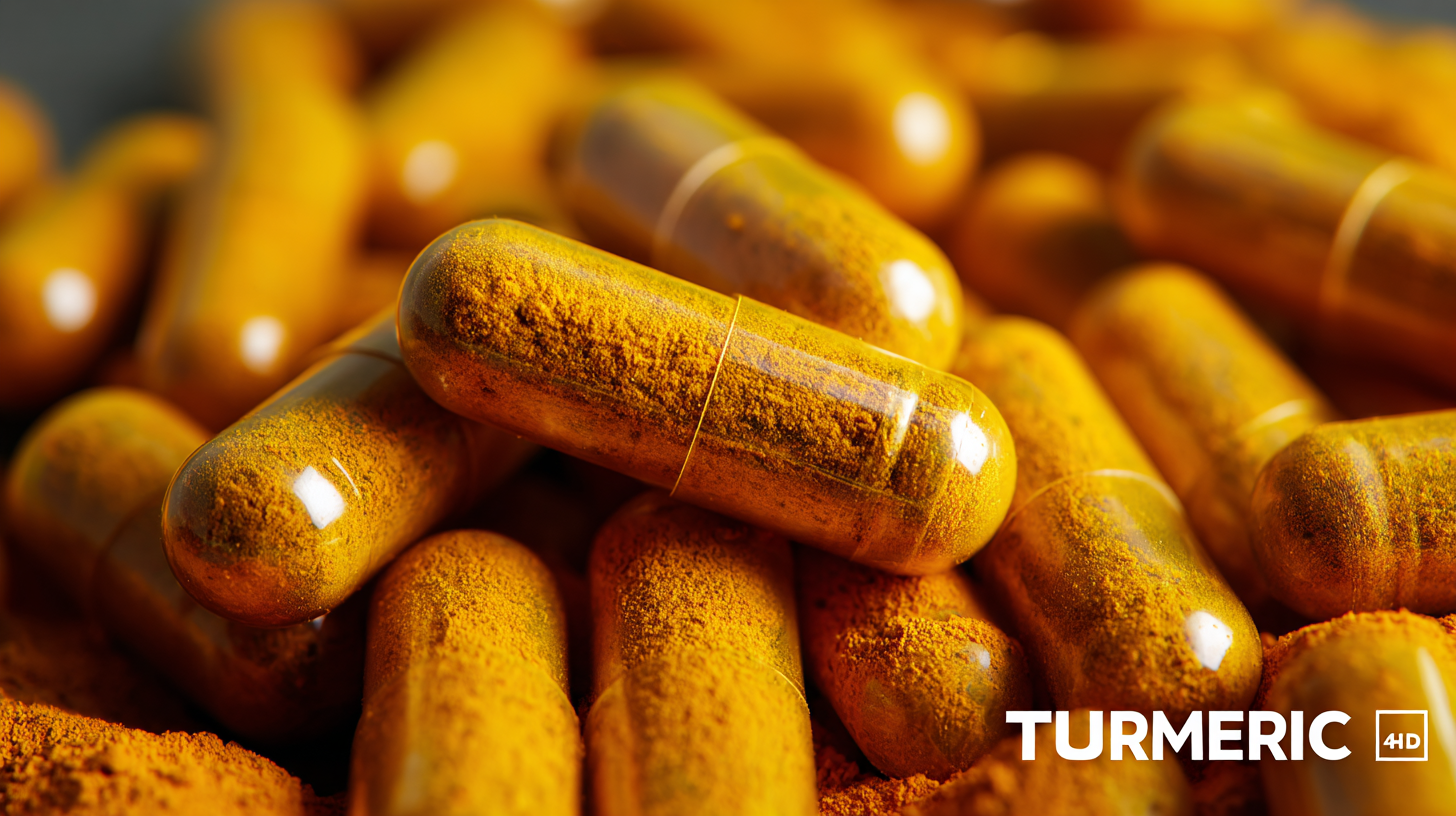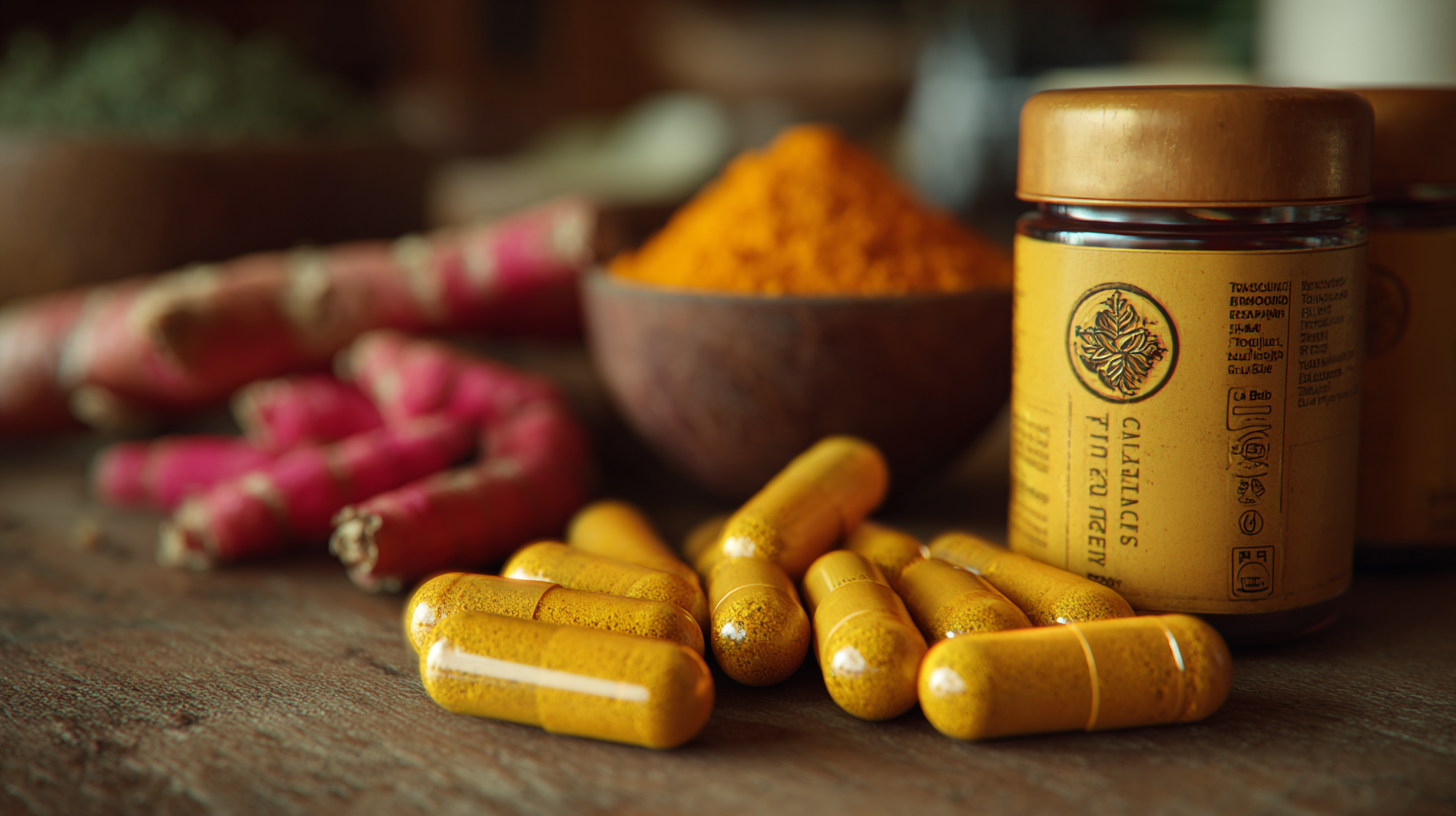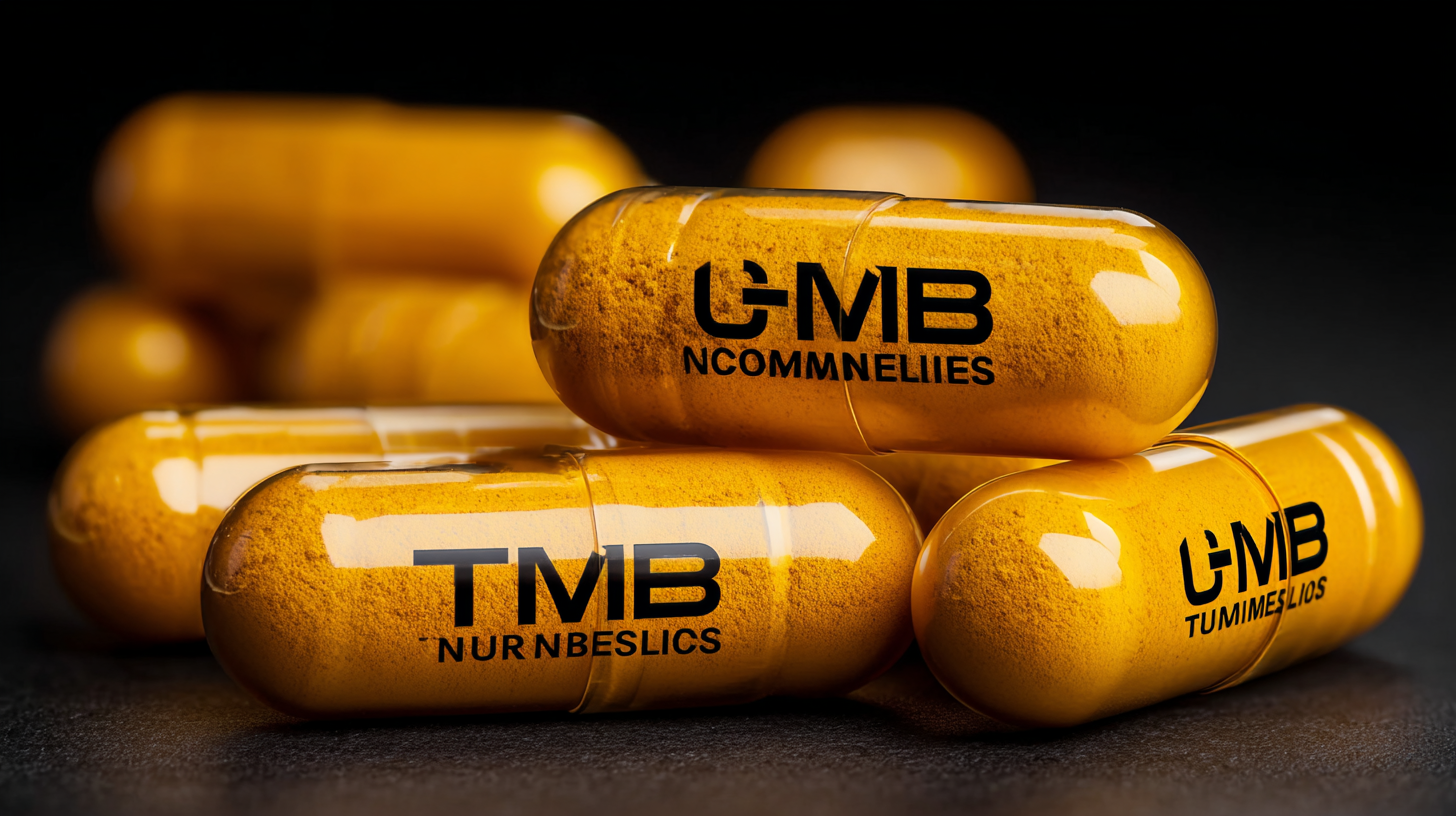50% Response rate
Navigating Challenges in the Global Sourcing of the Best Turmeric Capsules
In the competitive landscape of dietary supplements, turmeric capsules have emerged as a prominent choice for health-conscious consumers seeking natural anti-inflammatory and antioxidant support. According to recent market research, the global turmeric market is projected to reach approximately $9.09 billion by 2025, with a significant portion attributed to the rising popularity of turmeric capsules among millennials and health enthusiasts. The increasing awareness of turmeric's benefits, primarily driven by its active compound curcumin, has further intensified the demand for high-quality, efficacious products. However, navigating the challenges of global sourcing amidst varying quality standards, supply chain disruptions, and regulatory compliance presents a complex undertaking for manufacturers. As stakeholders seek to provide consumers with the best turmeric capsules available, understanding the intricacies of sourcing and ensuring product integrity becomes paramount in maintaining competitive advantage in this burgeoning market.

Identifying Quality Standards for Turmeric Capsules: What to Look For
When exploring the market for turmeric capsules, it's crucial to identify and understand the quality standards that ensure you're getting a product that is both effective and safe. One of the most important indicators of quality is the source of the turmeric used in the capsules. Opting for brands that specify the origin of their turmeric helps ensure that it is cultivated in regions known for producing high-quality rhizomes, such as India. Moreover, look for certifications that verify organic farming practices, as these generally indicate a higher standard of purity and potency.
Another key factor is the concentration of curcumin, the active compound in turmeric. Enhanced absorption formulations, such as those containing bioavailable curcumin or combined with piperine (black pepper extract), can significantly increase the effectiveness of the capsules. Additionally, reputable brands typically conduct third-party testing for quality assurance. This independent evaluation can provide peace of mind that you are consuming a harmless and effective supplement. When selecting turmeric capsules, always review labels for both ingredient transparency and any potential allergens to make a fully informed decision.
Navigating Challenges in the Global Sourcing of the Best Turmeric Capsules - Identifying Quality Standards for Turmeric Capsules: What to Look For
| Quality Parameter | Description | Recommended Standard | Testing Method |
|---|---|---|---|
| Curcumin Content | The primary active ingredient in turmeric known for its health benefits. | Minimum 95% curcumin content | High-Performance Liquid Chromatography (HPLC) |
| Purity | Absence of fillers, additives, or contaminants. | 100% pure with no additives | Gas Chromatography (GC) |
| Heavy Metals | Presence of harmful heavy metals like lead, arsenic, cadmium. | Lead < 1 ppm, Arsenic < 1 ppm, Cadmium < 0.5 ppm | Inductively Coupled Plasma Mass Spectrometry (ICP-MS) |
| Microbial Contaminants | Presence of bacteria, yeast, or mold in the product. | Total aerobic count < 100 CFU/g, E. coli negative | Aerobic Plate Count (APC) |
| Biological Activity | Effectiveness of the turmeric in biological systems. | Standardized to maintain activity | In vitro biological assays |
Understanding Global Sourcing Trends for Turmeric: Market Insights and Data
 The global turmeric market has witnessed significant growth, valued at approximately USD 5.5 billion in 2023. This upward trend is expected to continue, with projections estimating the market will reach USD 9.69 billion by 2032, reflecting a robust CAGR. The rising awareness of turmeric's health benefits, particularly curcumin, is driving demand across various sectors, including food and wellness. Furthermore, the turmeric coffee market is expected to grow substantially, aiming for USD 650 million by 2031 as consumers increasingly adopt these innovative products in their diets.
The global turmeric market has witnessed significant growth, valued at approximately USD 5.5 billion in 2023. This upward trend is expected to continue, with projections estimating the market will reach USD 9.69 billion by 2032, reflecting a robust CAGR. The rising awareness of turmeric's health benefits, particularly curcumin, is driving demand across various sectors, including food and wellness. Furthermore, the turmeric coffee market is expected to grow substantially, aiming for USD 650 million by 2031 as consumers increasingly adopt these innovative products in their diets.
As businesses navigate the complexities of global sourcing, staying informed on market dynamics is crucial. Here are some tips to optimize your sourcing strategies:
- First, prioritize sourcing from regions with a strong reputation for quality turmeric production, primarily in Asia.
- Second, leverage data analytics to track emerging trends and consumer preferences, allowing for timely adjustments to product offerings.
- Lastly, establish strong relationships with reliable suppliers to ensure consistency and quality in your turmeric supply chain.
Evaluating Supplier Certification: Ensuring Compliance with Industry Regulations
In the quest for high-quality turmeric capsules, the evaluation of supplier certifications emerges as a critical component to ensure compliance with industry regulations. Suppliers of turmeric products must demonstrate adherence to rigorous standards, such as Good Manufacturing Practices (GMP), which assure that their products are consistently produced and controlled according to quality standards. Valid certifications from reputable organizations not only enhance product credibility but also safeguard consumer health by ensuring that the capsules are free from contaminants and accurately labeled.
Furthermore, navigating the intricate landscape of certification can be daunting for buyers. It's essential to verify the legitimacy of the certifications presented by potential suppliers. This involves researching accreditation bodies, understanding the specific certifications applicable to herbal supplements, and considering the supplier’s track record in compliance with regulatory requirements. Partnering with suppliers who prioritize transparency and provide readily accessible documentation can help businesses mitigate risks and foster trust in the sourcing process. Proper due diligence in this area is not just a regulatory obligation but a vital step in securing effective and safe turmeric products for consumers.

Assessing Turmeric Quality: Key Factors that Influence Potency and Purity
When seeking high-quality turmeric capsules, understanding the key factors that influence potency and purity is essential. First and foremost, the source of turmeric plays a significant role. Turmeric grown in regions with ideal climatic conditions, such as India, often boasts higher curcumin content, which is the active ingredient responsible for many of its health benefits. Additionally, organic farming practices can help ensure that turmeric is free from harmful pesticides and chemicals, thus enhancing its purity.
Another important aspect to consider is the extraction process. Various methods, such as solvent extraction or CO2 extraction, can impact the quality of the final product. Cold-pressed methods or those that utilize minimal processing tend to preserve the natural compounds of turmeric better, resulting in a more potent product. Labels should be scrutinized for information regarding the extraction methods and any third-party testing results, as this transparency can give consumers confidence in the product's quality. By paying attention to these factors, consumers can make informed decisions when navigating the complex landscape of turmeric supplements.
Strategies for Building Long-term Relationships with Reliable Turmeric Suppliers
Building long-term relationships with reliable turmeric suppliers is essential for businesses aiming to ensure quality and consistency in their products. A recent report from Grand View Research indicates that the global turmeric market is projected to grow at a compound annual growth rate (CAGR) of 6.4% from 2021 to 2028, underscoring the importance of securing dependable sources as demand rises. Establishing trust with suppliers can lead to improved product quality, timely deliveries, and favorable pricing negotiations.
Tip: Engage with suppliers on a personal level by visiting their farms or production sites. This allows for a deeper understanding of their practices and helps build rapport. Regular communication, such as bi-monthly check-ins or collaborative goal-setting, will also strengthen your partnership and ensure both parties are on the same page regarding quality standards and supply expectations.
Furthermore, diversifying your supplier base can help mitigate risks associated with relying on a single source. Reports indicate that companies with a more extensive network of suppliers are better positioned to handle fluctuations in market demand and supply chain disruptions. Prioritize transparency and open dialogue with your suppliers; sharing insights about your business objectives can cultivate a collaborative approach that benefits both parties in the long run.
Tip: Consider implementing a supplier performance evaluation system to assess quality, reliability, and compliance, ensuring that you maintain strong partnerships with suppliers who meet or exceed your expectations.